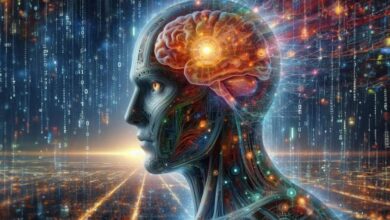Why Thinking Too Hard Can Make You Miserable


Mental effort is generally unpleasant, as confirmed by a meta-analysis involving over 4,600 participants across various tasks and demographics. People often pursue challenging activities for the rewards, not the pleasure of the task. Credit: SciTechDaily.com
New research shows that mental exertion is often linked with negative emotions.
A meta-analysis of 170 studies revealed that regardless of the task or population, increased mental effort correlates with feelings of frustration and stress. This phenomenon is less pronounced in Asian populations, possibly due to different educational experiences. Despite this, people still engage in mentally challenging tasks like chess, driven by the rewards rather than enjoyment of the effort itself.
Mental Effort and Discomfort
According to research published by the American Psychological Association, if somebody complains that it hurts to think, they may be onto something, as mental exertion appears to be associated with unpleasant feelings in many situations.
“Managers often encourage employees, and teachers often encourage students, to exert mental effort. On the surface, this seems to work well: Employees and students do often opt for mentally challenging activities,” said senior author Erik Bijleveld, PhD, of Radboud University. “From this, you may be tempted to conclude that employees and students tend to enjoy thinking hard. Our results suggest that this conclusion would be false: In general, people really dislike mental effort.”
The research was published in the journal Psychological Bulletin.
Insights From a Comprehensive Meta-Analysis
Researchers conducted a meta-analysis of 170 studies, published between 2019 and 2020 and comprising 4,670 participants, to examine how people generally experience mental effort. They did so by testing whether mental effort is associated with unpleasant feelings and whether that association depends on the task or the population involved.
The studies used a variety of participants (e.g., healthcare employees, military employees, amateur athletes, college students) from 29 countries and involved 358 different cognitive tasks (e.g., learning a new technology, finding one’s way around an unfamiliar environment, practicing golf swings, playing a virtual reality game). In all studies analyzed, participants reported the level of effort they exerted as well as the extent to which they experienced unpleasant feelings such as frustration, irritation, stress, or annoyance.
Across all populations and tasks, the greater the mental effort, the greater the unpleasantness experienced by participants.
Design Considerations for Professionals
“Our findings show that mental effort feels unpleasant across a wide range of populations and tasks,” said Bijleveld. “This is important for professionals, such as engineers and educators, to keep in mind when designing tasks, tools, interfaces, apps, materials, or instructions. When people are required to exert substantial mental effort, you need to make sure to support or reward them for their effort.”
One interesting finding, according to Bijleveld, was that while the association between mental effort and adverse feelings was still significant, it was less pronounced in studies conducted in Asian countries compared with those in Europe or North America. This fits with the general idea that the aversiveness of mental effort may depend on people’s learning history. High school students in Asian countries tend to spend more time on schoolwork than their European or North American counterparts and may therefore learn to withstand higher levels of mental exertion early on in their lives, he said.
Behavioral Implications of Mental Effort
More important is the real-world observation that despite the aversive nature of mentally challenging tasks, people still voluntarily engage in them said Bijleveld.
“For example, why do millions of people play chess? People may learn that exerting mental effort in some specific activities is likely to lead to reward. If the benefits of chess outweigh the costs, people may choose to play chess, and even self-report that they enjoy chess,” he said. “Yet, when people choose to pursue mentally effortful activities, this should not be taken as an indication that they enjoy mental effort per se. Perhaps people choose mentally effortful activities despite the effort, not because of it.”
Reference: “The unpleasantness of thinking: A meta-analytic review of the association between mental effort and negative affect” by Louise David, MSc, Maastricht University; Eliana Vassena, PhD, and Erik Bijleveld, PhD, Radboud University, 5 August 2024, Psychological Bulletin.
DOI: 10.1037/bul0000443



